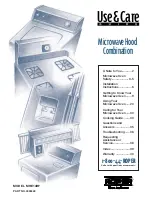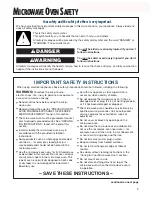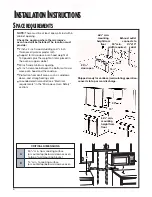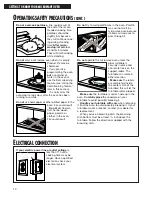
11
GETTING TO KNOW YOUR MICROWAVE OVEN
O
PERATING
SAFETY
PRECAUTIONS
Test dinnerware or cookware before using.
To test a dish for safe
use, put it into the oven
with a cup of water
beside it. Cook at 100%
cook power for 1 min-
ute.
If the dish gets hot
and water stays cool,
do not use it.
Never cook or reheat a whole egg inside the
shell.
Steam buildup
in whole eggs may
cause them to burst
and burn you, and
possibly damage the
oven.
Slice
hard-boiled
eggs before heating.
In rare cases, poached
eggs have been known
to explode.
Cover
poached eggs and
allow
a standing time of 1 minute before cutting
into them.
For best results, stir any liquid several times
during heating or
reheating.
Liquids
heated in certain
containers (especially
containers shaped like
cylinders) may become
overheated. The liquid
may splash out with a
loud noise during or
after heating or when
adding ingredients
(coffee granules, tea bags, etc.). This can harm
the oven and possibly injure someone.
Never
lean on the door or allow a child to swing on it
when the door is open.
Injury could result.
Use hot pads.
Microwave energy does not heat
containers, but the heat
from the food can make
the container hot.␣
Some dishes (melamine, some ceramic dinnerware,
etc.) absorb microwave energy, becoming too hot to
handle and slowing cooking times. Cooking in metal
containers not designed for microwave use could
damage the oven, as could containers with hidden
metal (twist-ties, foil lining, staples, metallic glaze
or trim).
T
ESTING
YOUR
DINNERWARE
OR
COOKWARE
continued on next page












































